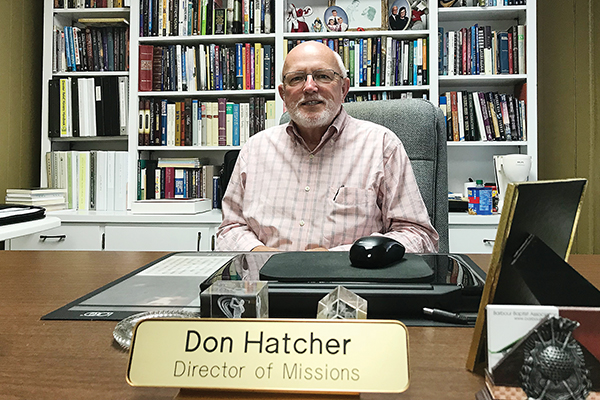By Grace Thornton
The Alabama Baptist
Don Hatcher can settle in and tell a lot of stories about what he’s seen God do.
He’s seen God take several churches of 30 or smaller and grow them into churches of several hundred. He’s seen God merge two congregations who were struggling into a vibrant new church that’s still growing.
And before any of that, He called Hatcher out of a different denominational background and into Southern Baptist life.
God has done amazing things, and as a pastor for decades and now associational missionary/director of missions for Barbour Baptist Association, Hatcher loves to tell about them.
He tells those stories with a smile.
‘My voice is a story’
But he also tells them with a strained, hoarse voice, one that sounds like he’s come down with a case of laryngitis this week — except he’s had it for eight years.
“My voice is a story in itself,” he said.
In 2010, Hatcher was diagnosed with spasmodic dysphonia, a neurological condition that prevents his vocal cords from vibrating as they should.
It’s not all that common, but it’s not uncommon either, he said. Often people who have spasmodic dysphonia have suffered a head trauma — which he hasn’t — or have used their voices vocationally, like teachers, singers, attorneys or preachers.
But even so, Hatcher has never met another preacher who has what he has. It’s incurable. For some, it’s helped by periodic Botox injections into the vocal cords, but that treatment didn’t work for him when he tried it — in fact, it made his voice even more whisper-like for a few months.
The only other option was vocal cord surgery, and that was a “very sensitive” surgery with a big risk — he could lose his voice totally if something went wrong.
So he opted not to risk it.
“The search committee knew this was a condition I was dealing with when we talked about me coming here to Barbour Baptist Association five years ago,” Hatcher said.
But they were behind him all the way.
“I try not to let it be a hindrance,” he said.
His main struggle is talking on the phone. Sometimes putting it on speakerphone helps with that. But he usually starts a conversation with, “I have a vocal cord condition, so if you can’t understand me, just tell me — I won’t be offended.”
Frustrations
And when Hatcher is in a large crowd with people he doesn’t know well, he often doesn’t contribute much to the conversation.
“That’s the most frustrating part of it probably, because I love to be able to be involved and contribute,” he said.
But he gets by just fine, he said. He’s got a smile that can’t be dimmed, especially when he talks about the churches he’s served or his wife, children and the seven grandchildren he’s watching grow up.
And when he preaches, something kind of miraculous happens — he has a big, booming voice. Sitting in his office, he demonstrates, and suddenly the place changes from library to auditorium.
A preacher voice
“When I preach, it’s crystal clear,” Hatcher said.
People think it’s a miracle, but medically speaking, vocal cords do something different when your brain pushes itself into a different kind of voice — a preacher voice, Hatcher said.
But to him and to others, it’s still a miracle. For talking to be such a daily struggle, he is able to preach more than half the Sundays of the year in churches around his association and beyond. In 2017 he preached 37 Sundays. This year, he’s already preached more than 25.
Rick Barnhart, director of the office of associational missions for the Alabama Baptist State Board of Missions, said it’s incredible to hear.
“It is amazing that despite his voice struggling that when he gets into the pulpit he can preach with clarity and strength,” he said.
And out of the pulpit, Hatcher has been a strong ministry partner, Barnhart said. “Don has been faithful in his service of a struggling association. We have worked together in assisting a couple of churches merging to form a stronger church and to better steward resources.”
It’s all part of God’s story, Hatcher said.
When he looks back over his life, he doesn’t immediately call up his spasmodic dysphonia as something he would change.
‘A good journey’
“I don’t know of anything I’d change about where God has brought me,” he said. “God’s been good to me. I give Him all the glory,” Hatcher said. “It’s been a good journey.”






Share with others: